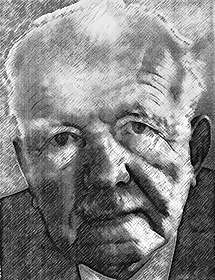Eduard Spranger
| Eduard Spranger | |
|---|---|
 A sketch of Eduard Spranger. | |
| Born |
27 June 1882 Berlin, Germany |
| Died |
17 September 1963 (aged 81) Tübingen, Germany |
| Nationality | German |
| Occupation | Philosopher and psychologist |
Eduard Spranger (27 June 1882 – 17 September 1963) was a German philosopher and psychologist. A student of Wilhelm Dilthey, Spranger was born in Berlin and died in Tübingen. He was considered a humanist who developed a philosophical pedagogy as an act of 'self defense' against the psychology-oriented experimental theory of the times. [1]
Thought
Spranger evaluated personalities in terms of six ideals or value orientations; theoretical, economic, aesthetic, social political and religious "types" of personality traits. [2]
Spranger contributed to the pedagogy of personality theory, in his book Types of Men [3] His value attitudes were:
- The Theoretical, whose dominant interest is the discovery of truth
- The Economic, who is interested in what is useful
- The Aesthetic, whose highest value is form and harmony
- The Social, whose highest value is love of people
- The Political, whose interest is primarily in power
- The Religious, whose highest value is unity [4]
Those six in more detail are:
Theoretical: A passion to discover, systemize and analyze; a search for knowledge.
Utilitarian: A passion to gain a return on all investments involving time, money and resources.
Aesthetic: A passion to experience impressions of the world and achieve form and harmony in life; self-actualization.
Social: A passion to invest myself, my time, and my resources into helping others achieve their potential.
Individualistic: A passion to achieve position and to use that position to affect and influence others.
Traditional: A passion to seek out and pursue the highest meaning in life, in the divine or the ideal, and achieve a system for living. This instrument is sometimes offered along with the DISC assessment.[5]
References
- ↑ Charle, Christophe; Schriewer, Jürgen (2004). Transnational Intellectual Networks: Forms of Academic Knowledge and the Search for Cultural Identities. Frankfort/New York: Campus Verlag.
- ↑ Gaus, Gerald F. (1990). Value and Justification: The Foundations of Liberal Theory. New York: Cambridge University Press.
- ↑ Spranger, Eduard; (translated by) Pigors, P.J.W (1914). Types of Men. G. E. Stechert Company, 1928: Lebensformen; Halle (Saale):.
- ↑ "Figure: Spranger's dimensions of value". Hfr.org.uk. Retrieved 2018-08-29.
- ↑ "Jumbovision Premiere Mobile LED Screens & LED Video Walls is under construction" (PDF). Brianroat.com. Retrieved 2018-08-29.